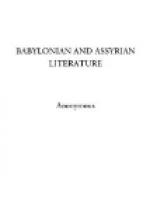The next in beauty on the throne is sold,
And thus the beautiful are sold for gold.
The richest thus select the beautiful,
The poor must take alone the dutiful
And homely with a dower which beauty bought,
And ugliness with gold becomes his lot.
The ugliest, unsightly, and deformed,
Is now brought forth; with many wriggles squirmed
She to the throne, where beauty late had sat:
Her ugliness distorted thus; whereat
The herald cries:
“Who
will this woman take
With smallest dowry? She can cook and bake,
And many household duties well perform,
Although she does not claim a beauty’s charm.
Who wants a wife?”
The
ugly crone with blinks
Doth hideous look, till every bidder shrinks.
A sorry spectacle, mis-shapen, gross,
She is, and bidders now are at a loss
How much to ask to take the hag to wife.
At last one cries:
“Five
bilti,[20] for relief
Of herald I will take, to start the bid!”
“And four of bilti, I’ll take,
with the maid!”
“Three and a half!” one cries with shaking
head,
“And she is yours, my man!” the herald
said,
And thus she bought a husband and a home.
And so the scare-crows, scraggy ones, now come
In turn; the lean, ill-favored, gawky, bald,
Long-nosed, uncouth, raw-boned, and those with scald
And freckled, frowsy, ricketty and squat,
The stumpy, bandy-legged, gaunt, each bought
A man; though ugly as a toad, they sold,
For every man with her received his gold.
The heaped-up gold which beauteous maids had brought
Is thus proportioned to the bidder’s lot;
The grisly, blear-eyed, every one is sold,
And husbands purchased for a pile of gold,
And happiness diffused throughout the land;
For when the maid refused her husband’s hand
She might return by paying back the gold.
And every maid who thus for wife was sold
Received a bond from him who purchased her,
To wed her as his wife, or else incur
The forfeit of his bond, and thus no maids
In all the land were found as grumbling jades,
Whose fate it was to have no husbandman,
For every woman had a husband then.
[Footnote 1: We have included in Tablet IV Tablets V and VI of the original, as classified by Mr. Sayce.]
[Footnote 2: The above is taken from an Assyrian fragment ("W.A.I.,” ii. 35, No. 4) translated in “Records of the Past,” vol. xi., pp. 159, 160, and presents the Assyrian view of purity and the customs of their people.]
[Footnote 3: Literally, “whose veil no freeman of pure race has raised.” Before slaves and men of mean rank, women of the East are not obliged to veil the face.]
[Footnote 4: Literally, “who has never moistened her teeth with an intoxicating liquor.” “Rec. of the Past,” p. 160, l. 6.]




